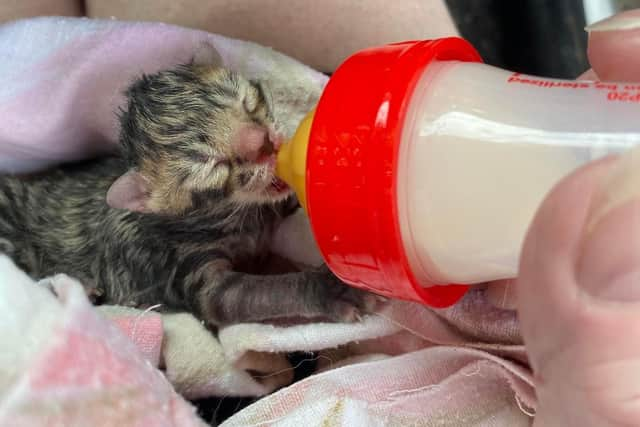Cat rescues caught in year-long fight to capture and rehome 50-strong feral colony in Marton
and live on Freeview channel 276
Homeward Bound and Fylde Coast Cats were alerted to the group of up to 50 felines in June last year, and since then have been systematically catching, neutering and rehoming the animals in an attempt to drive down the wild population.
So far, between 15 and 20 cats have been removed from the land, but there are still another 20 to be caught.
Advertisement
Hide AdAdvertisement
Hide AdHomeward Bound founder Wendy Mulela said: “It has taken us a while because previously the person who owned the land was reluctant to give us access. However, we have halved the population there, and have neutered an awful lot of cats.


“If left, the colony will only get bigger and before you know it, there will be hundreds of them.
“It has been challenging; there have been kittens born in the course of us trying to sort it out, which has increased the problem.”
If left alone, it is feared the colony may eventually pose a danger to pet cats in the area, as many of the strays carry feline immunodeficiency virus, which can be spread through territorial fighting.
Advertisement
Hide AdAdvertisement
Hide AdWendy said: “These pockets of feral cats tend to start by people not neutering their cats, then moving away and leaving their pets behind. They breed in the wild, and become feral.
“The trouble is, finding homes for feral cats is really difficult. We have rehomed some to stables and farms, but they are few and far between.
“We’re going to have to widen our scope and get help from cat rescues outside the area.”
Kim Millard, of Fylde Coast Cats, said: "(The colony) has probably been there about 20 years, maybe more. There's a lot of FIV in the colony. Most of them have got flu. They're not in the best condition.
Advertisement
Hide AdAdvertisement
Hide Ad"Trapping them first of all is difficult because they are wandering quite a bit. A lot of them may be pregnant. Relocating them is a nightmare because nobody wants a feral. Relocating one or two is one thing, but 20 is something else altogether. Obviously there's the medical charges which puts the financial pressure on.
"We have managed to neuter quite a few of them over the years, but the landowner at the time wouldn't let us take them away. We were able to help, which was great, but we weren't able to solve the issue until now."
Wendy added: “The main thing people can do to prevent colonies is to have their cat neutered. Kittens can be neutered by the time they’re four months and weigh at least a kilo. It’s a simple operation.
“Some of the ferals we have managed to capture are lovely cats, but most of them have cat flu, many of them have FIV, and a lot of them needed dental operations which cost an arm and a leg. We have had three cats from there who have cost us £1,300 each. It’s a heartbreaking situation, because it’s so easily preventable.”
Thanks for reading. If you value what we do and are able to support us, a digital subscription is just £1 for your first month. Try us today by clicking here